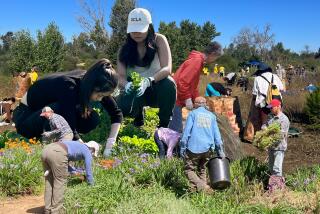Parents in the School: From Novelty to Norm : Teachers Have the Need, Volunteers the Interest--and It’s a Way to Keep Track of How Your Kids Are Doing
- Share via
The role of parent volunteer has expanded beyond that of bake-sale organizer. Schools increasingly are asking parents to perform an array of duties on campus.
Parent volunteers in Orange County provide computer expertise, help run school libraries and share their artistic talents. They grade papers, tutor pupils in reading and answer phones in the front office.
Many teachers have come to count on parental help to get their work done. And in the process, many parents find dividends for themselves and their children as they learn how the education system works.
In Bonita Canyon School in Irvine, it’s not unusual to find several parents volunteering in each classroom daily in the primary grades.
“It’s just kind of the culture of the school to volunteer and participate,” said Charlotte Chamberlin, a human resources director for Boeing who was volunteering recently in an after-school art class on campus. While the teacher taught the children lessons about pop artist Andy Warhol, Chamberlin kept a close eye on the students who were carving linoleum blocks to make Warhol-like multiple prints.
Another day, parent Carolyn David, an accountant for a family business, helped in the library by showing children how to find call numbers and write a bibliography. Homemaker Lanie Borgman stayed in her 6-year-old son’s class to help students decorate paper-bag hats for an art project.
There often tends to be more parental involvement in middle-class schools, where it is more likely that one parent stays home or parents have more flexible working hours.
But schools in Santa Ana and other areas with large numbers of poor families have been working on drawing in interested parents as well.
Patricia Oropeza, mother of two at Pio Pico School in Santa Ana, never had a chance to go to high school when she was growing up. The Mexican native had to help support the six-member family by selling gum and sweets and helping her mother, the family’s breadwinner, sell cosmetics.
Yet she makes it a point to come to school two or three times a week to read books in the classroom and help the teacher correct work sheets.
Like many other parent volunteers, Oropeza finds that in addition to helping the school, her efforts help her son as well.
She views her time in the classroom as a way to show her sons she cares about school and to encourage them to reach dreams that seemed out of her reach.
“I want to help [my sons] as much as I can so they have the opportunity to go to college,” Oropeza said. “I did not have that opportunity, so I want to help them get down that road.”
Parents also find more tangible benefits to helping out at school.
They know who their kids are hanging out with and which teachers they might want their child with in a future grade. They understand what is expected in terms of homework and when it is due, which children sometimes either don’t understand or don’t communicate to their parents.
Parent volunteers forge relationships with teachers who are in a position to offer advice or keep a careful eye out for a parent’s special concern. They can keep better tabs on how their children are functioning in class, and whether they need home help with flash cards or reading. And they might find out such useful information as special programs their children might qualify for, or be able to help influence which teachers their children are assigned to the next year.
After volunteering in her daughter’s class, Bonita Canyon parent Chris Betourne realized her daughter was a strong reader. As a result, Betourne instructed the child’s tutor to spend less time on reading and more on math. Having watched the math lessons in class, Betourne could also tell the tutor to focus on similar lessons.
Bonita Canyon teacher Lisa Friedberg recalled how one parent volunteer during a conversation informed Friedberg that her son was trying to deal with the death of a close family member. That day Friedberg took the boy aside and warned him that the heroine of the “Bridge to Terebithia,” which they were reading that day, would die.
If you want to go outside during the reading session today, you can, she told the boy. He took her up on the offer.
(BEGIN TEXT OF INFOBOX / INFOGRAPHIC)
How to Be a Big Help
Teachers appreciate the time parent volunteers give, but they also have suggestions on how those volunteers can be of the greatest help and get the most out of the experience.
* Parents must be reliable. That means showing up when you say you will.
“That’s No. 1,” said Leslie Murtaugh, a second-grade teacher at College Park School in Costa Mesa. “I’ve gotten things for you and things I’ve planned. It puts me on a rush all day if you don’t show up.”
* Don’t gossip to other parents or outsiders about what you learn about students in class, or act as the snitch who tells another parent about his or her child’s misbehavior.
“They have to be professional,” said Janice Johnson, a third-grade teacher at Arroyo School in Tustin. She has dismissed at least one parent volunteer for not being discreet about what students do in the classroom.
* Work on helping all the children. Avoid the tendency to gravitate to your own child.
* Leave younger children with a baby-sitter; don’t bring them to class, where they can be disruptive.
* Volunteer regularly so that you develop a rapport with the students and know what to expect.
“You want to challenge them, and sometimes they will do just as little as they can get away with if you don’t know what the child is capable of,” said kindergarten teacher Carlome Herman of Star View School in Midway City.
* Don’t feed children answers, teachers said. Give them some more time or more prompting to solve the problem on their own.
* Act as a helpful pair of “eyes and ears for the teacher,” said Anna Friesen, who teaches art at a number of schools in Orange County. Take the initiative to help children the teachers can’t get to and inform the teacher of students who may be struggling.
* Be patient and positive. Try to avoid criticizing children.
More to Read
Sign up for Essential California
The most important California stories and recommendations in your inbox every morning.
You may occasionally receive promotional content from the Los Angeles Times.













